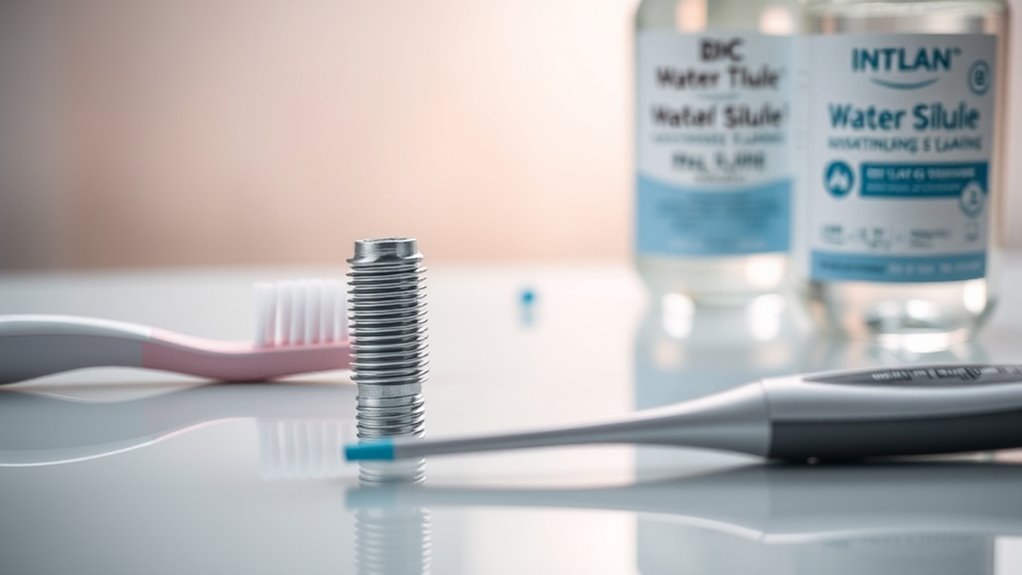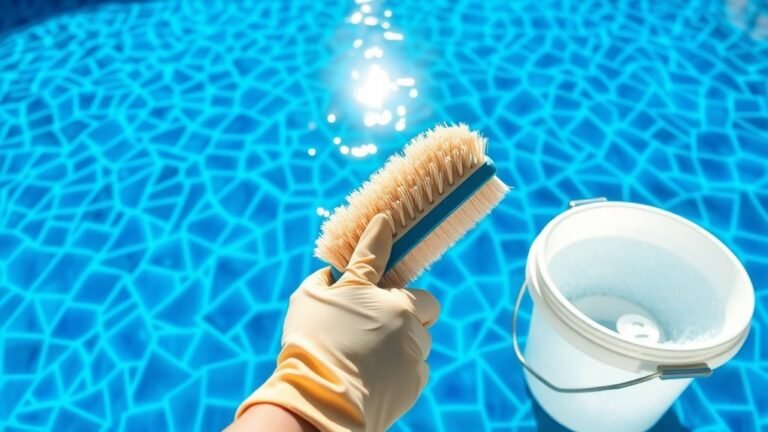How to Clean Permanent Dental Implants
To clean your permanent dental implants, brush them twice daily with a soft-bristled toothbrush and non-abrasive toothpaste. Use dental floss or a water flosser for hard-to-reach areas, and rinse with an alcohol-free antimicrobial mouthwash afterward. Regular dental check-ups every six months are essential for monitoring implant health and detecting any issues early. Avoid sticky or hard foods that could cause damage. You’ll discover additional tips for maintaining your implants’ cleanliness and longevity.
##
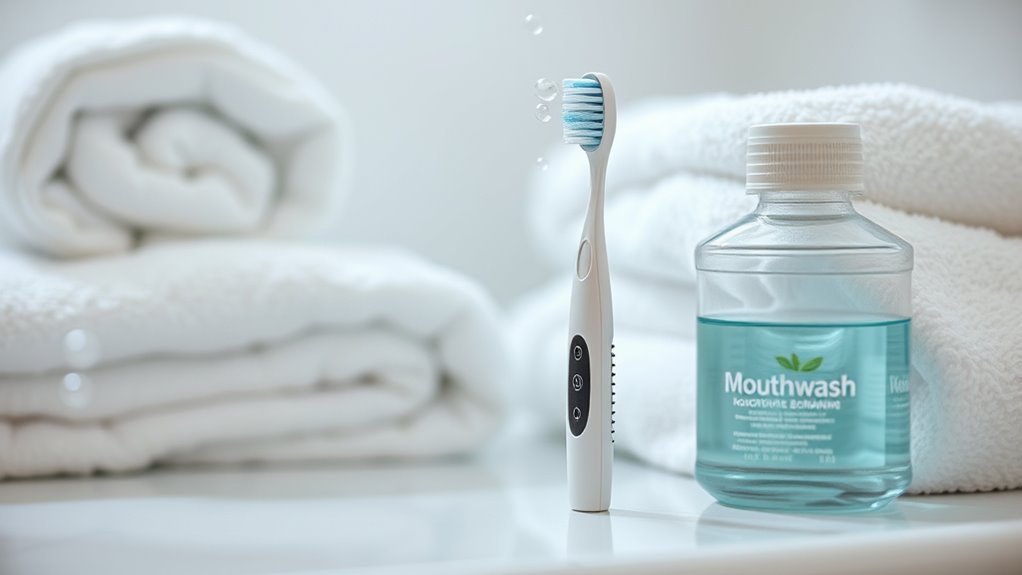
Maintaining your dental implants is crucial for ensuring their longevity and safeguarding your overall oral health. In this article, we will provide you with essential tips and best practices for effective implant care, including the significance of a consistent oral hygiene routine and the proper techniques for brushing and flossing around your implants. You’ll learn how to prevent plaque buildup and gum disease, the importance of regular dental check-ups, and how to address any potential issues promptly. By following the guidance in this article, you’ll be empowered to take control of your dental health and maintain a confident, radiant smile for years to come.
Preparation For Cleaning
Proper preparation is essential for effectively cleaning your dental implants. To guarantee your cleaning process is smooth and efficient, follow these steps:
Effective cleaning of your dental implants starts with proper preparation for a smooth and efficient process.
- Review your oral hygiene routine and make necessary adjustments.
- Schedule your cleaning sessions regularly, aligning them with your cleaning schedule.
- Gather any recommended materials or products for your implants.
- Set aside a quiet, comfortable space where you can focus on cleaning.
- Consult your dental professional for personalized advice or specific instructions.
Tools and Chemical Required
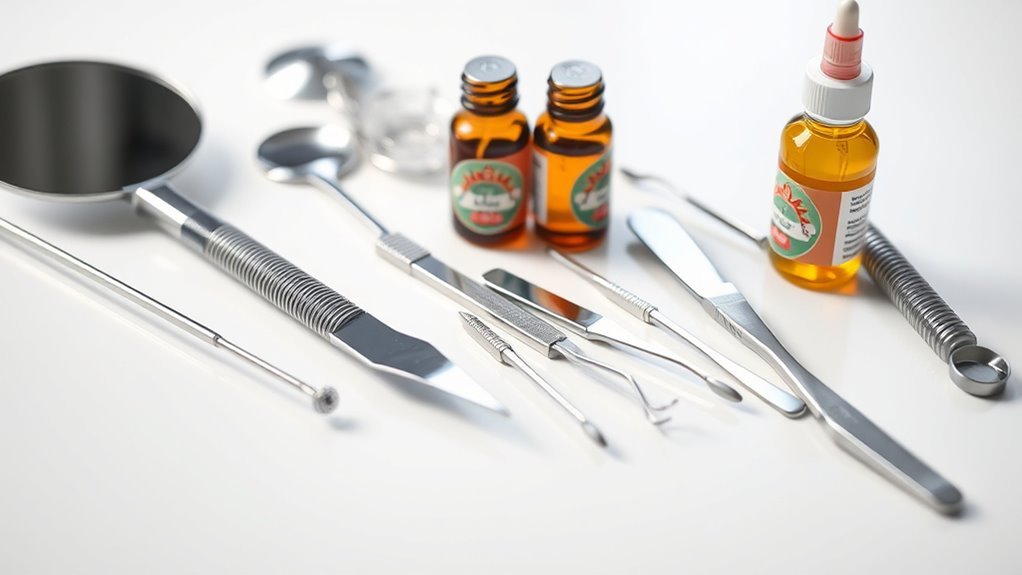
After preparing for your cleaning routine, the next step involves gathering the right tools and chemicals to guarantee effective maintenance of your dental implants. Essential cleaning supplies for optimal dental hygiene include soft-bristled toothbrushes, non-abrasive toothpaste, and antimicrobial mouthwash. Additionally, a water flosser can help remove debris between implants.
| Tools | Purpose |
|---|---|
| Soft-bristled toothbrush | Gentle plaque removal |
| Antimicrobial mouthwash | Reduces bacteria and freshens breath |
| Water flosser | Cleans between implants |
Utilizing these tools consistently guarantees that your dental implants remain clean and healthy, allowing you the freedom to enjoy your smile without worry.
How to Clean:
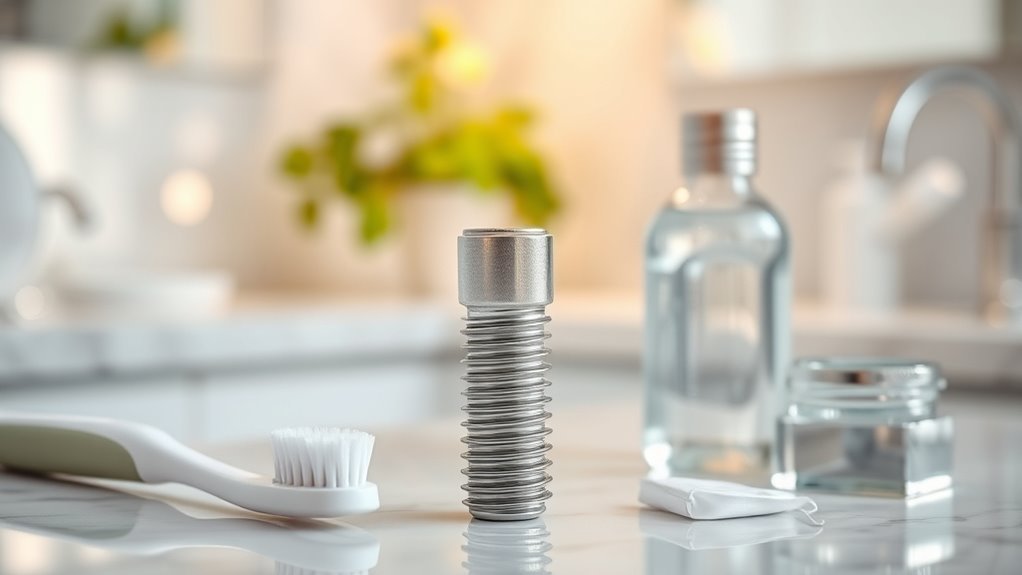
Step-by-Step Guide: How to Clean Your Dental Implants
To maintain the longevity and health of your dental implants, establishing a consistent cleaning routine is essential. Effective implant maintenance not only enhances your oral hygiene but also prevents complications. Follow these detailed steps to ensure your implants remain in excellent condition.
Step 1: Brush Your Dental Implants
- Frequency: Brush your dental implants twice daily.
- Toothbrush Type: Use a soft-bristle toothbrush to prevent damage to the implant surface.
- Technique: Gently brush around the implant area, ensuring you reach all surfaces without applying excessive pressure.
Step 2: Use Non-Abrasive Toothpaste
- Product Choice: Choose a non-abrasive toothpaste specifically designed for dental implants.
- Reason: Avoid abrasive pastes that can scratch the surface of your implants, leading to wear or complications over time.
Step 3: Floss Daily
- Flossing Tools: Utilize a floss threader or special implant floss designed for cleaning around implants.
- Method: Carefully guide the floss between the implant and surrounding gums. Ensure you clean beneath the gum line to remove plaque buildup.
Step 4: Rinse with Antimicrobial Mouthwash
- Product Selection: Choose an antimicrobial mouthwash that is alcohol-free to prevent irritation.
- Usage: Rinse your mouth with the mouthwash after brushing and flossing to help reduce bacteria and maintain oral hygiene.
Step 5: Schedule Regular Dental Check-Ups
- Frequency: Visit your dentist every 6 months or as recommended.
- Purpose: Regular check-ups will allow your dentist to assess the condition of your implants, check for signs of complications, and provide professional cleaning if necessary.
Integrating these practices into your daily routine guarantees your implants stay in excellent shape, allowing you to enjoy the freedom of a healthy smile. Prioritizing oral hygiene is essential for your overall well-being.
Safety Consideration
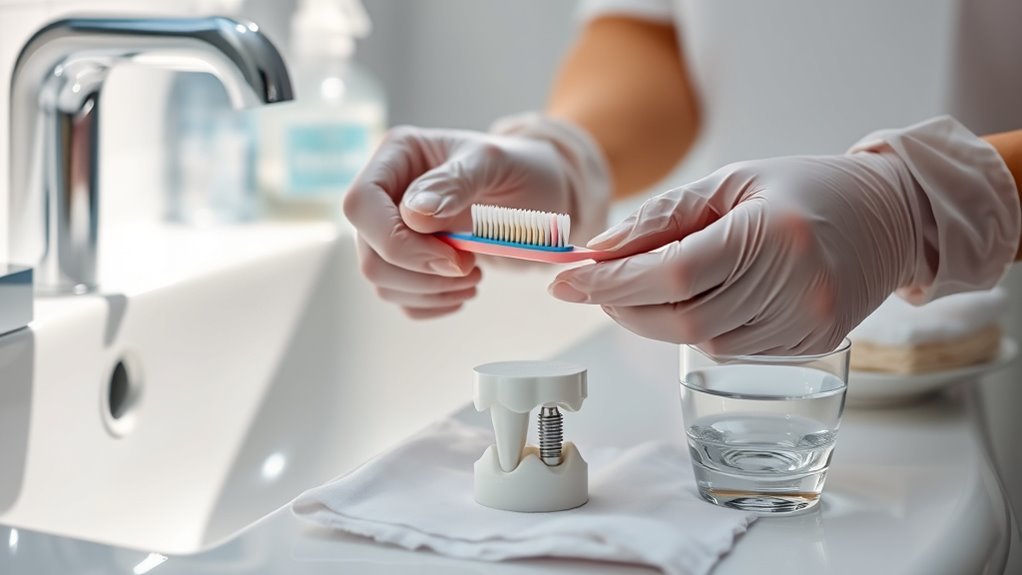
Ensuring the safety of your dental implants involves several key considerations that can greatly impact your oral health. First, prioritize oral hygiene by brushing and flossing regularly, as this helps prevent plaque buildup around the implants. Regular dental check-ups are essential; your dentist can identify any potential issues early on. Additionally, be mindful of infection prevention—always use a soft-bristled toothbrush and non-abrasive toothpaste to avoid damaging the implant surface. If you notice swelling or pain, consult your dentist promptly to address any concerns. Finally, avoid tobacco products, as they can hinder healing and increase infection risk. By following these guidelines, you can maintain the integrity of your implants and enjoy a healthier smile.
Tips to keep clean for long time
While maintaining dental implants requires consistent effort, there are several effective strategies to keep them clean for the long term. By following these tips, you’ll guarantee your implants remain in peak condition:
Maintaining dental implants takes dedication, but effective strategies ensure they stay clean and in excellent shape for years to come.
- Schedule regular check-ups with your dentist to monitor implant health.
- Practice proper brushing techniques twice a day, focusing on both teeth and gums.
- Use an interdental brush or floss designed for implants to reach difficult areas.
- Rinse with an antibacterial mouthwash to reduce plaque buildup.
- Avoid sticky or hard foods that can damage your implants.
Frequently Asked Questions
Can I Use Regular Toothpaste on My Dental Implants?
You shouldn’t use regular toothpaste on your dental implants, as some toothpaste types can be abrasive and may scratch the surface. Instead, opt for non-abrasive, fluoride-free products specifically designed for implant care. These will help maintain the integrity of your implants while effectively cleaning them. Always consult your dentist for recommendations tailored to your needs, ensuring your dental health remains a priority while you enjoy your restored smile.
How Often Should I Visit the Dentist After Getting Implants?
You should visit your dentist every six months after getting implants for regular check-ups and maintenance. This helps guarantee your implants remain healthy and function well. During these visits, your dentist can assess your aftercare routine and provide guidance on implant maintenance. If you experience any issues or discomfort, don’t hesitate to schedule an earlier appointment. Keeping up with these visits is key to enjoying the freedom of your new smile.
Will Dental Implants Stain Over Time?
Dental implants generally won’t stain like natural teeth, as they’re made from non-porous materials. However, neglecting dental hygiene can lead to surrounding gum issues or plaque buildup, which might affect their appearance. In fact, studies show that 20% of implant patients experience some form of discoloration due to poor care. To guarantee stain prevention, maintain a consistent oral hygiene routine and visit your dentist regularly. Your implants deserve that care for a lasting, bright smile!
Can I Floss Around My Dental Implants?
Yes, you can definitely floss around your dental implants. It’s essential for effective implant maintenance. Use proper flossing techniques, like dental tape or a floss holder, to gently clean around the implant and gums without causing irritation. Be sure to floss daily to remove food particles and plaque. Regular flossing not only helps maintain your implants but also promotes overall oral health, giving you the freedom to enjoy a confident smile.
Are There Any Foods to Avoid With Dental Implants?
You should avoid hard foods and sticky candies with dental implants. Studies show that nearly 30% of implant failures are linked to improper care, including diet. Hard foods can put excessive pressure on implants, leading to damage or discomfort. Likewise, sticky candies can cling to your implants, making it harder to clean and increasing the risk of decay around them. For your well-being, prioritize softer, healthier food choices to protect your investment.
